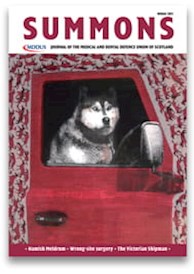THE NOTION of what constitutes ‘expertise’ in ethics is fascinating. It is a relatively young discipline and those working in the field are drawn from a wide range of backgrounds. People with training in medicine, law, philosophy, social sciences, medical humanities and theology rub along, for the most part, happily together under the broad umbrella of ‘ethics’. The subject’s disregard for disciplinary boundaries is one of the features that first attracted me to the world of ethics and I continue to learn much from those whose backgrounds differ from mine.
I am often asked by students and clinicians what they should do to pursue their interest or develop a career in ethics. For those who are dipping a tentative toe in the ethical waters, I often suggest some time observing or, if a vacancy exists, participating in a local clinical ethics committee. For those who are more certain of their interest in ethics, there are myriad educational opportunities ranging from short courses to masters and doctoral programmes. Although curricula differ, a good course will provide a space in which to reflect on values, discuss the moral dimensions of medicine and engage with the theoretical literature that underpins contemporary medical ethics. Yet, in common with medicine, the practice of ethics is a lifelong endeavour that becomes meaningful when it moves beyond the pages of a text or the debates of a lecture theatre.
The relevance of expertise and experience was illustrated for me recently. I have long-provided clinical ethics support for several NHS Trusts and last month agreed to work with another hospital, partly as a member of the Clinical Ethics Committee and partly in the clinical setting with teams. The Committee encourages its members to complete the UK Clinical Ethics Network Competency Log which is a self-assessment tool to evaluate personal competence against a series of descriptors that were agreed via a national consultation process.
It was an interesting exercise. I feel, as I should given my role, confident about my familiarity with ethical principles, core concepts and a wide range of analytic frameworks and tools. I felt similarly comfortable about the skills I use when applying my knowledge but realised that those were not skills I had learned as part of my training in medicine, ethics or law. The skills I use most often in supporting clinical ethics are derived from what I have learned to become an educator, an accredited mediator and counsellor. The ability to respond to emotion, contain conflict, reconcile multiple perspectives, listen carefully, facilitate participation, foster trust and maintain neutrality in the face of competing agendas and hierarchies is as much part of ethics expertise for me as my formal qualifications.
When I reached the part on the questionnaire that asked about my confidence in understanding and responding to the local needs, culture and preferences of the hospital with whom I will be working, I ticked ‘novice’. I realised that no amount of knowledge or skills, be they derived from studying philosophy, law and medicine or practice-based training such as mediation, teaching and counselling, was sufficient to consider myself anything other than a beginner in my new environment. To be effective, I need to understand the priorities, preferences and predilections of my clinical colleagues. All hospitals and clinical teams work, superficially, in similar ways yet each has its own identity, delights and quirks.
Ethics is an inherently human business and that is rarely captured in lecture theatres, textbooks, academic papers or seminar rooms. Theoretical frameworks and analytical tools are useless without the ability to understand and engage with the people who deliver and experience healthcare. Irrespective of one’s brilliance, or otherwise, at recognising and explaining a moral problem, it is the professional hierarchies, personal alliances, tribal loyalties and professional rivalries that bring the ethical dilemma to life. Like the old woman in Bernstein’s Operetta Candide, an ethicist must be “easily assimilated”.
Each time I meet a new team or am invited to work in a different organisation, I return to novice status and begin the process of meeting, observing, listening and enquiring. Personable inquisitiveness is the order of the day. There is no substitute for taking the time to learn about the context in which ethics is to be practised, nor is it something that can be replicated in a formal educational setting or a postgraduate degree.
Even if one acquires the heady heights of ‘expert’ in the field of ethics, the knowledge, skills and experience that underpin such expertise are necessary but not sufficient. To practise ethics requires practice and cannot be done alone. Without the support and trust of colleagues and patients, expertise counts for little. Ethics is embodied, literally, by those who claim expertise and we must all prove our worth to those we serve.
Deborah Bowman is a senior lecturer in medical ethics and law at St George’s, University of London
This page was correct at the time of publication. Any guidance is intended as general guidance for members only. If you are a member and need specific advice relating to your own circumstances, please contact one of our advisers.
Read more from this issue of Insight

Save this article
Save this article to a list of favourite articles which members can access in their account.
Save to library